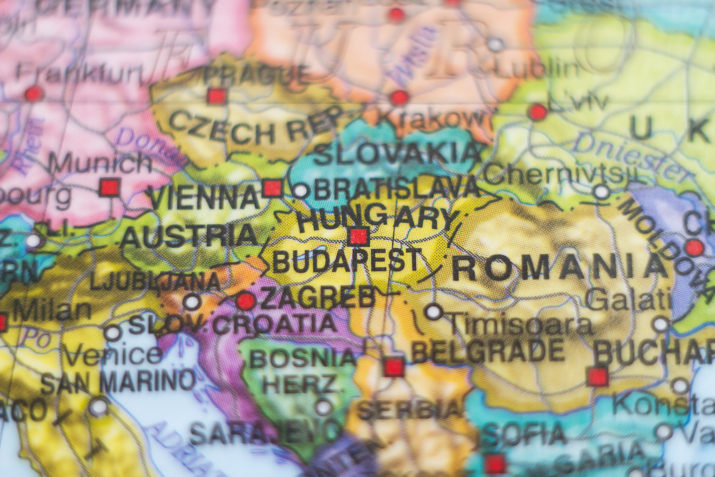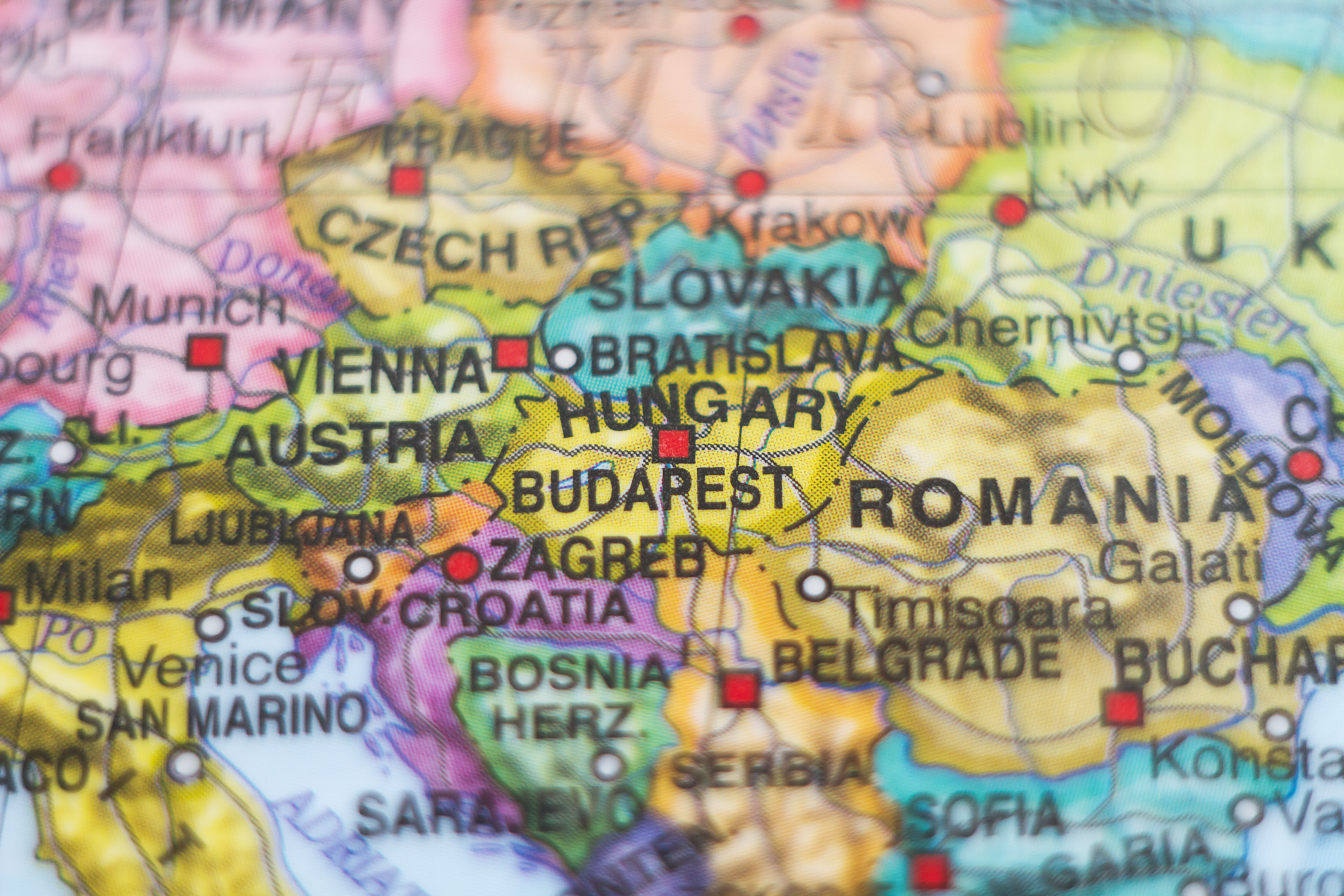

This is part of our Campus Spotlight on the University of Glasgow/Nankai University Joint Graduate School.
Overview
This course is designed to appeal to students interested in the geopolitics and international relations of the Central European region. It will provide students with the opportunity to examine the key foreign policies, geopolitical developments and international political relations of Central Europe, with specific attention given to the Visegrád countries of Poland, Hungary, Czech Republic and Slovak Republic. The course will review contemporary conceptualizations of Central Europe, examine regional political cooperation, European and transatlantic integration, new emerging security challenges and national foreign policy development.
Aims and Intended Learning Outcomes
The course aims to:
- enable students to critically examine the place of these Central European states within regional, European and international geopolitical discourses;
- emphasis the strategic priorities and attitudes of the Central European states towards (1) each other; (2) the EU and its member and prospective member states and regions including Germany, the Baltic States and the Western Balkans; (3) NATO and the USA; (4) states in the eastern neighbourhood region, including Russia and Eastern Partnership countries; and (5) international regions and states (e.g. China).
- encourage the use of a comparative approach to understanding the driving forces behind national and regional positions on key geopolitical matters including European and regional integration, foreign policy development and new security challenges (e.g. energy, migration).
By the end of this course, students should be able to:
- critically assess the impact of transition and European integration upon the geopolitical environment of post-Cold War Central Europe;
- compare, contrast and evaluate levels of power and status among Central European states;
- utilise theories/perspectives of international relations to help explain how power shapes individual, regional and international political relations of Central European states;
- comprehensively appraise the role and influence of the EU, NATO and major world powers in Central Europe;
- describe and critically evaluate the differing and shared strategic goals of Central European states and how these inform their foreign policy priorities;
- identify and assess the new security challenges facing Central Europe and explain how they inform international relations across the region.
Teaching for this class will include through a mix of weekly, 2-hour seminar sessions and via tasks set within the course online learning environment, Moodle. Students are expected to participate in both classroom and online discussion. Seminars have a mixed format of tutor AND peer-led discussion, group-work and individual presentations. The seminars will enable students to engage both autonomously with their learning, but also provide space for shared learning via group based discussion and opportunities to work together in small groups.
The course conforms to relevant SCQF Level 11 (masters) expectations and learning will be:
- Practice relevant;
- Research informed;
- Personally and professionally transformative;
- Collaborative in nature;
- Challenge assumptions and widens perspectives; and
- Aspire to make a positive impact on your educational experience.
The course is taught by Dr Eamonn Butler, Senior Lecturer in Central and East European Studies at the University of Glasgow and a member of the Glasgow-Nankai Joint Graduate School Teaching Faculty.
Core Reading
There is no core text for this course. However, the following books will provide a useful background to some of the themes covered by this course.
- Kanet, R.E. (ed.) (2005) The New Security Environment: The Impact on Russia, Central, and Eastern Europe. Aldershot: Ashgate.
- Kuus, M. (2007). Geopolitics Reframed: Security and identity in Europe’s Eastern Enlargement. New York: Palgrave Macmillan.
- Sabic Z. and Drulak, P. (2012) Regional and International Relations of Central Europe. Basingstoke: Palgrave
Students should be aware that the reading lists below are indicative of only a selection of the available literature and are designed to give you an idea of the range of material available. At Master’s Level Students are encouraged to develop their own reading lists and identify relevant sources and literature. Students should also be aware that many of the texts listed for a particular seminar topic will also be of use for other topics.
To help provide some background and theory on foreign policy and geopolitics students are encouraged to look at some of the texts on this short list in advance of taking the class.
Bátora, J. (2012) ‘Europeanisation of Foreign Policy: Whither Central Europe? in Sabic Z. and Drulak, P. (2012) Regional and International Relations of Central Europe. Basingstoke: Palgrave, pp.219-238.
Beasley, R., Kaarbo, J., Lantis, J.S. and Snarr, M.T. (2013) Foreign Policy in Comparative Perspective: Domestic and International Influences on State Behaviour. Sage: London. See chapters 1 and 15.
Fawn, R. (2003) ‘Ideology and National Identity in Post-communist Foreign Policies’, Journal of Communist Studies and Transition Politics, 19(3),pp.1-41.
Fedorov, Y. (2013) “Continuity and change in Russia’s Policy towards Central and Eastern Europe”, Communist and Postcommunist Studies, 46 (3), pp.315-326.
Hildreth, S.A. and Ek, C. (2008) Long Range Ballistic Missile Defence in Europe, CRS Report for Congress, Washington DC.
Gora, M. (2011) ‘The Changing Nature of Foreign Policy and International Relations in Central and Eastern Europe’, in Gora, M. and Zielinska, K. (2013) Democracy, State and Society. European Integration in Central and Eastern Europe. Krakow: Jagiellonian University
Handl, V. and Paterson, W.E. (2013) “The continuing relevance of Germany’s engine for CEE and the EU”, Communist and Postcommunist Studies, 46 (3)pp.327-337.
Kurowaka, X. and Nemeth, B. (2013) ‘The Central European Playground: Who Plays What? ‘European Geostrategy, available at: http://europeangeostrategy.ideasoneurope.eu/files/2013/05/Long-Post-6.pdf
Marton, P. (2012) ‘The Sources of Visegrád Conduct: A Comparative Analysis of V4 Foreign Policy-making’, The Polish Quarterly of International Affairs, Issue 4/2012.
Mikulova, K. (2013) ‘Central Europe’s Velvet Power: Can It Reinvigorate EU Foreign Policy?’ World Affairs Journal, available at: http://www.worldaffairsjournal.org/article/central-europe%E2%80%99s-velvet-power-can-it-reinvigorate-eu-foreign-policy
Mintz, A. and DeRouen K. Jr. (2010) Understanding Foreign Policy Decision Making. Cambridge: Cambridge University Press
Ondrejcsák, R. (2006) ‘Security policies of the Slovak Republic and Hungary – the ‘Limited Differtiation in Central Europe’, International Issues and Slovak Foreign Policy Affairs 15(3-4), pp.76-90.
Palmer, G. and Morgan T.C. (2006) A Theory of Foreign Policy. Princeton: Princeton University Press. Chapter 1 Introduction.
Trapons, J.A. (1997). “National Security Concepts in Central and Eastern Europe”, NATO Review, 6(45), pp.27-30.
Tulmets, E. (2014) East Central European foreign policy identity in perspective: back to Europe and the EU’s neighbourhood. Basingstoke: Palgrave MacMillan. [Read all of Part 2 E-book GUL
Wyllie, J.H. (1997) European security in the new political environment: an analysis of the relationships between national interests, international institutions and the great powers in post-Cold War European security arrangements. Harlow: Longman
Journals which students on this course should find useful include:
- Central European Journal of International and Security Studies
- Communist and Post-Communist Studies
- Europe-Asia Studies
- East European Politics and Societies
- European Security
- European Union Politics
- Debatte
- International Security
- Journal of Baltic Studies
- JCMS / Journal of Common Market Studies
- Journal of Communist Studies and Transition Politics
- JCER / Journal of Contemporary European Research
- Journal of Democracy
- NATO Review
- Post Communist Economies
- Problems of Post-Communism
- Review of International Studies
- Security Journal
- Security Studies
Students are also encouraged to make use of the Central and East European Online Library (CEEOL) database, which gives access to full text articles from over 500 journals from across the CEE region. Many of these journals are published in the English language and will be referred to throughout the course. Access to the CEEOL database is at: https://www.ceeol.com/
Region specific journals and Magazines include:
Czech Republic:
- Central European Journal of Public Policy
- Contemporary European Studies
- Perspectives: Review of International Affairs
- Transitions Online
Hungary:
- CEU Political Science Journal
- European Integration Studies
- The Analyst – Central and Eastern European Review
- The Hungarian Quarterly
- Foreign Policy Review
Poland:
- New Eastern Europe
- PISM Strategic Files
- The Polish Foreign Affairs Digest
- The Polish Quarterly of International Affairs
- Yearbook of Polish Foreign Policy
Slovakia:
- International Issues & Slovak Foreign Policy Affairs
- Slovak Foreign Policy affairs
- Yearbook of Slovakia’s Foreign Policy
Please note that suggested readings under each seminar topic are limited for purposes of this syllabus overview. Students taking this course will have access to a more comprehensive reading list.
Introduction to Course
Seminar 1
Conceptualising Central Europe and its relevancy to regional, European and international geopolitics
This seminar will provide a brief overview of the course. This seminar is designed as an introduction which will present students with a brief history of the Central European region and its engagement with the wider Europe (including Russia/Soviet Union). It will set the scene for the course and explain why it is relevant to understand this region in the context of regional, European and international geopolitics.
Suggested Reading
- Batt, J. (2013) “Introduction: Defining Central and Eastern Europe” in S. White, J. Batt & P.G. Lewis, Developments in Central and East European Politics 5. Basingstoke: Palgrave.
- Drulak, P. (2017) “The West, the Centre and the East: assessing the strategic options of Central Europe”, Global Affairs, Vol 3 (1), pp.5-15.
- Kiss, L.J. (2010) “Central Europe: ‘Imagined Spaces’ and Challenges of the 21st Century”, Foreign Policy Review, pp.76-98.
- Zielinski, B. and Kulec, M. (2017) “Central Europe at the Crossroads: Controversies of geopolitics and Culture”, UDK 327(4-191.2)
Regional Political Cooperation and European Integration
Seminar 2
Visegrád and regional political cooperation
This seminar will examine the Visegrád group from its inception through to present formation. It will introduce students to the various functions and roles of the organisation and look at some of the recent critical literature on the group. Students will be asked to quantify the importance of the group for the Central European region and what it means for sub-regional partnerships within the European Union.
Suggested Reading
- Dangerfield, M. (2008) ‘The Visegrád Group in the Expanded European Union: From Preaccession to Postaccession Co-operation’, East European Politics and Societies, 22, 3.
- Dangerfield M. (2014) ‘V4: A new brand for Europe? Ten years of post-accession regional cooperation in Central Europe’, Poznan University of Economics Review, 14 (4), pp.71-90.
- Fawn, R. (2013) ‘Visegrad: Fit for Purpose?’, Communist and Post-Communist Studies. 46 (3). Pp.339-349.
- Toro, C., Butler, E., and Gruber, K. (2014) ‘Visegrád: the evolving pattern of co-ordination and partnership after EU enlargement.’Europe Asia Studies, 66 (3). pp. 353-358.
Seminar 3
European Union / Eastern partnership
This seminar will examine the relationship between the Central European States and the EU. It will cover the security rationales for EU enlargement and look at key policy areas where the EU impacts upon foreign policy concerns of the Central European States, specifically Eastern Partnership. It will also explore the EU presidencies held by CEE states and introduce some of the challenging aspects of political relations between the CEE states and the EU to emerge in recent years.
Suggested Reading
- Ágh, A. (2014) ‘Ten Years of the EU Membership in the New Member States: Decline in democracy, good governance and competitiveness’, ECPR Joint Sessions 2014.
- Baun, M. & Marek, D. (eds) (2013) The New Member States and the European Union: Foreign Policy and Europeanization(Basingstoke, Routledge)
- Copsey, N. (2013) ‘The EU and Central and East European Politics’, in S. White, J. Batt & P. G. Lewis (eds) Developments in Central and East European Politics 5. Basingstoke, Hampshire: Palgrave, Ch. 5.
- Copsey, N. and Pomorska, K (2013) ‘The Influence of Newer Member States in the European Union: The Case of Poland and the Eastern Partnership’, Europe-Asia Studies, 66(3)
- Dangerfield, M. (2009) ‘The Contribution of the Visegrád Group to the EU’s Eastern Policy: Rhetoric or Reality’, Europe-Asia Studies, 61, 10.
Seminar 4
NATO / Hybrid Warfare
This seminar will examine how Central Europe dealt with its need for military security following the disbandment of the Warsaw Pact and the move to obtain NATO membership. Students are encouraged to examine this issue from the perspective of the various Central European countries and Russia and consider how the continued enlargement of NATO to Eastern Europe has impacted relations between CEE states and Russia / Western Europe in recent years.
Suggested Reading
- Croft, S. Redmond, J., Wyn Rees, G., Webber, M. (1999b). The Enlargement of Europe. Manchester: Manchester University Press. [chapter on NATO]
- Lanoszka, A. (2016) ‘Russian hybrid warfare and extended deterrence in eastern Europe’, International Affairs, Volume 92, Issue 1, 1 January 2016, Pages 175–195
- Marton, P. and Eichler, J. (2013) “Between willing and reluctant entrapment: CEE countries in NATO’s non-European missions”, Communist and Postcommunist Studies, 46 (3). Pp.351-362
- Schimmelfennig, F (1998) ‘NATO Enlargement: A Constructivist Explanation’: Security Studies. Vol 8 (2-3)
- Wade, J. (2004) The Enlargement of the European Union and NATO: Ordering from the Menu in Central Europe. Cambridge: Cambridge University Press.
National Foreign Policies and Security Strategies in Geopolitical Context
Seminar 5
Poland
This seminar will examine Polish Foreign and Security Policies and how they have developed throughout the post-communist era.
Suggested Reading
- The White Book on National Security of the Republic of Poland (2013) – available in Moodle. Please note you will not read all of this but you should look at it and become familiar with its objectives.
- Longhurst, K. (2013) “Where from, Where to? New and old configurations in Poland’s Foreign and Security Policy Priorities”, Communist and Postcommunist Studies, 46 (3), pp.363-372
- Bieńczyk-Missala, A. (2016) “Poland’s Foreign and Security Policy: Main Directions”, Revista UNISCI / UNISCI Journal, No 40 (January 2016).
Seminar 6
Hungary
This seminar will examine Hungarian Foreign Policy and how it has developed throughout the post-communist era.
Suggested Reading
- Hungarian MFA (2011) Hungary’s Foreign Policy After the Hungarian Presidency of the Council of the European Union. Budapest: MFA
- Jóźwiak, V. (2017) ‘Hungary’s Foreign Policy in a Changing International Environment’, PISM Bulletin, No 31. (971) March.
- Tatrai, P., Eross, A. and Kovaly, K. (2017) “Kin-state politics stirred by a geopolitical conflict: Hungary’s growing activity in post-Euromaidan Transcarpathia. Ukraine”, Hungarian Geographical Bulletin, Vol 66(3). Pp.203-218.
- Terenyi, J. (2010). “Hungary’s Foreign Policy Perspective of Central Europe”, Foreign Policy Review, pp. 3-16.
- Varga, G. (2009). “Central European Security Identity and Transatlanticism – A Hungarian Perspective”, International Issues and Slovak Foreign Policy Affairs, 4, pp.44-56
Seminar 7
Czech Republic/Slovakia
This seminar will examine Czech and Slovak Foreign and Security policies and how they have developed throughout the post-communist era.
Suggested Reading
- Brezani, P. (2017) Yearbook of Slovakia’s Foreign Policy 2016. Research Center of the Slovak Foreign Policy Association: Bratislava.
- Czech Government (2015) “Concept of the Czech Republic’s Foreign Policy”, Ministry Foreign Affairs of the Czech Republic.
- Lajčák, M. (2012) ‘Twenty Years of Slovak Foreign Policy’, International Issues and Slovak Foreign Policy Affairs, Issue 3-4/2012
- Slovak Government (2017) “Foreign Policy Website” available at: https://www.mzv.sk/web/en/foreign_policy
- Weiss, T. (2011) ‘Projecting the Re-discovered: Czech Policy Towards Eastern Europe’, Review of International Affairs, Issue 2/2011, pp.27-44.
Specialist Case Studies – Geopolitical Challenges
Seminar 8
Migration and the EU
This seminar will debate the refugee and asylum crisis that emerged in Europe from 2015, as well as the responses of the CEE states and the EU. Specific attention will be given to recent policy developments and the reactions of the EU to resistance by the CEE states to accept refugees on a solidarity basis.
Suggested Reading
- Gallai, S., Horváth, D. and Horváth-Sántha, h. (2017) Migration as a Political and Public Phenomenon: The Case of Hungary. Chapter 2.
- Ignatieff, M. (2017) ‘The Refugee as Invasive Other’, Social Research: An International Quarterly, Volume 84, Number 1, Spring 2017, pp. 223-231
- Ivanova, D. (2016) ‘Migrant Crisis and the Visegrad Group’s Policy’, International Conference Knowledge-based Organization, Vol 22 (1), pp. 35-39.
- Pap, N. and Remenyi, P. (2017) ‘Re-bordering of the Hungarian South: Geopolitics of the Hungarian border fence’, Hungarian Geographical Bulletin 66 (3), pp.235-250.
- Witold, K. (2017) ‘Security First—New Right-Wing Government in Poland and Its Policy Towards Immigrants and Refugees’, Surveillance & Society 15(3/4): 523-528.
- Zaun, N. (2017) ‘States as Gatekeepers in EU Asylum Politics: Explaining the Non-adoption of a Refugee Quota System’, JCMS: Journal of Common Market Studies, 56(1), pp.44-62.
Seminar 9
Energy and Russia
This seminar will look at how the Central European states address matters relating to energy security. This will include relations with third parties such as Russia which remains the region’s larger supplier of energy. It will also look at aspects of merger and acquisition in the Central European energy market and why this creates a possible security dilemma for the region.
Suggested Reading
- Butler, E. (2013) ‘Strengthening the EU’s Energy Remit: Hungary, Poland and the Presidency of the Council of the European Union in 2011’, International Journal of Energy Security and Environmental Research, 1, 1.
- Butler, E. (2018) ‘Hungary’. In: Ostrowski, W. and Butler, E. (eds) Understanding Energy Security in Central and Eastern Europe: Russia, Transition and National Interest. (London, Routledge).
- Butler, E. and Ostrowski, W. (2018) ‘Rethinking Energy Policy in Central and Eastern Europe’, EUCERS Reflections, volume 4, Spring 2018.
- Dannreuther, R. (2018) ‘Energy Security in Central and Eastern Europe – an IR Theoretical Dimension’. In: Ostrowski, W. and Butler, E. (eds) Understanding Energy Security in Central and Eastern Europe: Russia, Transition and National Interest. (London, Routledge).
- Fawn, R. (2018) ‘Czech Republic’. In: Ostrowski, W. and Butler, E. (eds) Understanding Energy Security in Central and Eastern Europe: Russia, Transition and National Interest. (London, Routledge).
- Ostrowski, W. (2018) ‘Poland’. In: Ostrowski, W. and Butler, E. (eds) Understanding Energy Security in Central and Eastern Europe: Russia, Transition and National Interest. (London, Routledge).
- Petrovič, J. (2009) ‘Energy Security in the Slovak Republic’, Yearbook of Slovakia’s Foreign Policy, Issue 1/2009.
- Rossiaud, S. and Locatelli, C, (2018) ‘Russian Energy Companies and the Central and Eastern European Energy Sector’. In: Ostrowski, W. and Butler, E. (eds) Understanding Energy Security in Central and Eastern Europe: Russia, Transition and National Interest. (London, Routledge).
Seminar 10
China – regional and international relations
This seminar will look at how the Central European states understand China and how relations between the region and China have evolved in recent years. Specific attention will be given to the place of the CEE region in the Belt and Road initiative and the emergence of the 16+1 group of countries.
Suggested Reading
- Castro, T., Vickova, J. and Hnat, P. (2017) ‘Trade and investment relations between the Czech Republic and China: the Czech Republic as a gateway to the EU?’, Society and Economy in Central and Eastern Europe, 39(4). Pp.481-499.
- Dudas, T. (2017) ‘Foreign Direct Investments as a Tool of the Expansion of Chinese Corporations in V4 Countries’, in Innovation Management, Entrepreneurship and Sustainability, Proceedings of an International Conference.
- Fürst, R. and Tesař, F. (eds) (2013) China’s Comeback in Former Eastern Europe: No Longer Comrades, Not Yet Strategic Partners (Prague: Institute of International Relations).
- Jóźwiak, V. (2017) ‘China’s Role in Hungarian Foreign Policy’, PISM Bulletin, No. 71 (1011) 21 July 2017.
- Kowalski, B. (2017) ‘China’s foreign policy towards Central and Eastern Europe: The “16+1” format in the South-South cooperation perspective. Cases of the Czech Republic and Hungary’, Cambridge Journal of Eurasian Studies, 1, 2017, #7R65ZH
- Szczudlik-Tatar, J. (2015) ‘Coming out of the shadows: the Polish perspective on China–Central and Eastern Europe relations’, International Issues & Slovak Foreign Policy Affairs, 24(3), pp49-59.
Photo:Photo of a map of Hungary and the capital Budapest | Shutterstock
Published on June 5, 2018.




